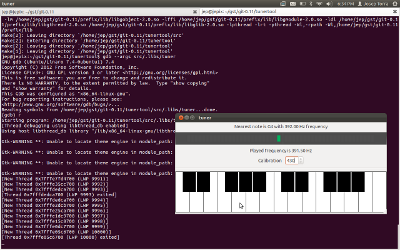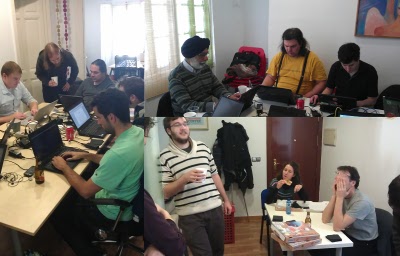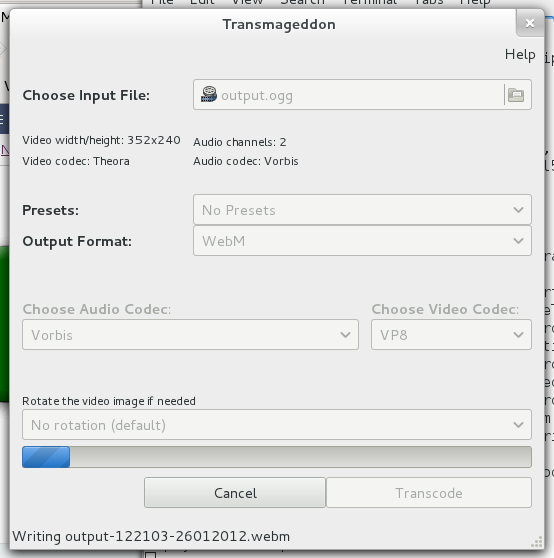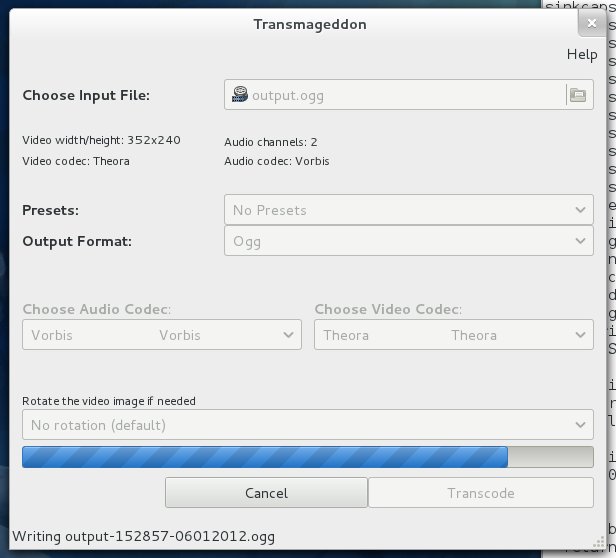After a long period of very slow development of Transmageddon where most work has been in debugging issues with GStreamer 0.11 and porting existing features to GTK3 and GStreamer 0.11, I decided it was time to start thinking about where to go forward again. That said, there are still some issues with the new GTK3 and GStreamer 0.11 version, but I needed a break from just tedious porting/re-implementation work and instead start looking at some new ideas and features.
There are two major items I am thinking of. The first is what to do with the usecase of people just wanting to create a manual transcode. The goal of Transmageddon is to make transcoding simple, but the problem is that I am trying to simplify something that is inherently quite complex. The current user interface doesn’t really let you set a lot of things and I know that sometimes that will create files that doesn’t conform to the needs of the user, for instance a lot of settings are just kept from the original output file, like number of audio channels or bitrate used and so on. And many others just rely on the default values of the GStreamer elements used. I don’t want to try to support tweaking all of them through the user interface as there is no way of doing so without making the user interface either cluttered or filled with what will be for most people just gibberish. It is the problem I feel for instance Handbrake is suffering from, that yes it does let you set everything you could ever need, so it can create files that will be useable in some cases where the default user interface of Transmageddon falls short, but it also becomes a hard to navigate jungle for people. My answer to the need for that level of settings is and will continue to be the device profiles option, which I also have some plans for. That said there are a couple of features I do think would be useful to enable from the non-preset interface, like being able to resize the video, choose if you want deinterlacing or not and to allow you to choose stereo output for the audio and finally I want to allow the creation of transcoding queues, so you don’t have to wait until one transcode is finished before configuring another one.
The one special feature I already got in there, the ability to rotate the video, so that if your video for instance was shot with a camera held sideways, also felt rather arbitrary (it was put in there due to a very early bug request) to have exposed in the userinterface.
So what I have been experimenting with is as user interface which has an Advanced menu option in which you can set certain things and also enable certain extra options in the user interface.

Idea around adding an Advanced option in Transmageddon
So as you see in the screenshot above there are certain options which you just turn on/off and certain options which when enabled will add extra elements to the userinterface as shown below.
If I go down this route the question of course comes what options to put into this Advanced menu and also if I should make the settings persistent accross runs of Transmageddon or if I should let Transmageddon return to its default settings every time you start it.

Transmageddon with all advanced options enabled
The Transmageddon editor
Of course the Advanced menu will never become the solution to all transcoding challenges, the device profiles will still be that. But I realized that editing textfiles is not for everyone and it also makes creating advanced profiles a task for even fewer people than there needs to be. I don’t know how many people out there have made their own profiles, but the only one I ever got submitted was from Stefan Kost who made one for the N900. That is probably mostly due to lack of documentation of how to create profiles and where to put them, a problem I have been planning to remedy. That said I realized that maybe creating some kind of editor would be an even better solution, as it could provide a lot of helpful tools for profile creation and thus making it accessible to a lot more people. Which is why I been trying to prototype what such an user interface could look like.

Screenshot of prototype for Transmageddon profile editor
The interface above is what I got so far, and it is just a glorified profile viewer atm, but my hope is to make it fully functional and hopefully useful to people. One feature I really want to do is to allow you to take an existing video, have the profile editor analyze it and create a new profile that will allow you to replicate the settings of that file. So when you get a new phone or device the manufacturer most likely put a sample file on it, you can then load that sample into the editor and the editor will create a profile that matches it. This will enable you to transcode other files to that profile and thus make them work on your device.
That said this will be a major task creating this editor, because I want to to contain a lot of clever logic, so that it doesn’t just end up being a glorified text editor, but I will need to test and experiement to figure out what that logic will be and how to expose it in the user interface.
Anyway, I am hoping to hear back from the community on these two new things and playing with to hear what you think, both from a usability standpoint and of course ideas for how the features could work or should not work, and what you would need to make Transmageddon suit your needs.







